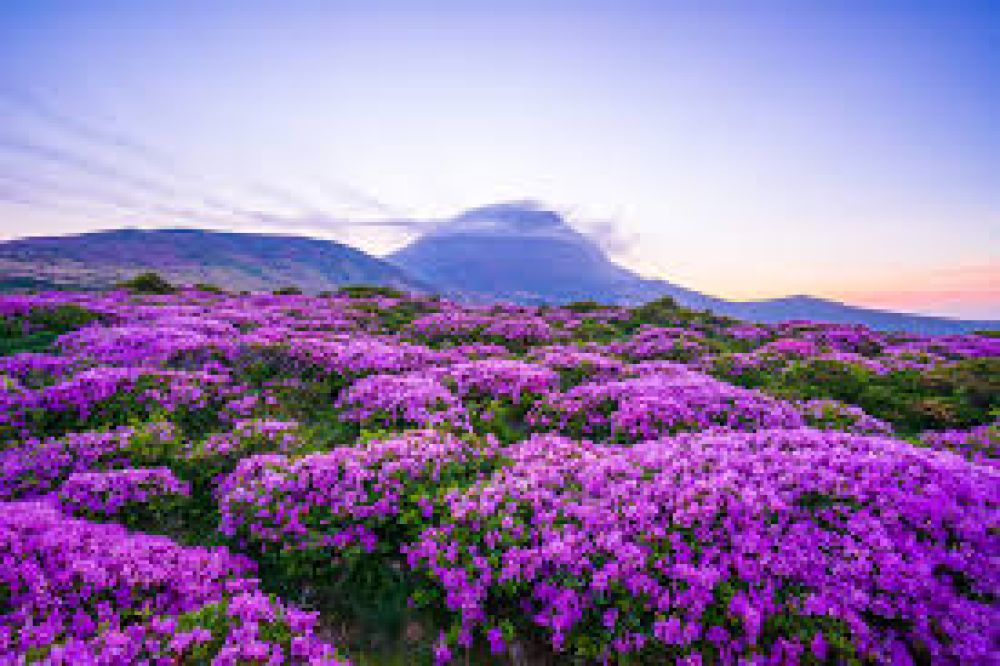Food History of Hallasan National Park, Jeju, South Korea
The food culture in and around Hallasan National Park is deeply intertwined with the island's geography and history. Jeju Island, where Hallasan National Park is located, is a volcanic island with rich and fertile soil that supports a diversity of crops. Traditionally, the locals have relied on both agriculture and seafood to sustain their diet. The island is particularly famous for its citrus fruits, particularly the Hallabong, which is a variety of mandarin orange.
Jeju's culinary traditions have also been influenced by its relative isolation and the need for food that could withstand long, harsh winters. This led to the development of various fermented foods, notably kimchi. Over time, with the influx of tourists, the cuisine around Hallasan has evolved to include a mix of traditional Jeju foods and modern Korean cuisine.
Must-Try Top 10 Food Dishes in Hallasan National Park, Jeju, South Korea
- Jeonbokjuk (Abalone Porridge) - Enriched with abundant abalone, this non-veg delicacy is a comforting and nutritious dish showing the island’s seafood bounty.
- Haemul Pajeon (Seafood Pancake) - A savory non-veg pancake filled with fresh local seafood and green onions, crispy on the outside and soft on the inside.
- Jeju Black Pig BBQ (Heuk Dwaeji) - This non-veg dish features pork from pigs indigenous to Jeju, known for their unique flavor and tender meat.
- Gogi Guksu (Jeju Pork Noodle Soup) - A popular non-veg noodle soup made with thin wheat noodles and a rich meaty broth.
- Omegi Tteok (Sweet Rice Cakes) - A chewy and sweet veg rice cake made with glutinous millet flour and often filled with red bean paste.
- Jeju Tangerine or Hallabong - These incredibly sweet, seedless, and easy-to-peel citrus fruits are veg and a must-have when visiting Jeju.
- Seongge Guksu (Sea Urchin Noodle Soup) - A non-veg Jeju specialty, this noodle soup is made with sea urchin, giving it a distinctive ocean flavor.
- Galchi Jorim (Braised Beltfish) - A non-veg dish featuring beltfish simmered in a flavorful spicy sauce with vegetables.
- Jeju Hanbang Maeuntang (Spicy Herbal Fish Stew) - This non-veg stew is bursting with fresh fish, vegetables, and a unique blend of Jeju herbs.
- Bingtteok (Buckwheat Pancake) - A veg pancake that serves as a warming delicacy, especially during the colder months, made with buckwheat, a crop widely grown on Jeju Island.
Top Famous Restaurants in Hallasan National Park, Jeju, South Korea
- Myeongjin Jeonbok (명진전복)
-
Address: 1282-17, Seohaean-ro, Gujwa-eup, Jeju-si, Jeju-do
Famous Food: Jeonbokjuk (Abalone Porridge) - Non-veg
- Hanlim Pocha (한림포차)
-
Address: 24, Hanlim-ro 1-gil, Jeju-si, Jeju-do
Famous Food: Haemul Pajeon (Seafood Pancake) - Non-veg
- Donsadon (돈사돈)
-
Address: 19, Pyeonghwa-ro, Jeju-si, Jeju-do
Famous Food: Jeju Black Pig BBQ - Non-veg
- Jeju Mihyang (제주미향)
-
Address: 374-4, Yeon-dong, Jeju-si, Jeju-do
Famous Food: Gogi Guksu - Non-veg
- Odoroki Momil (오돌락모밀)
-
Address: 534, Johamhaean-ro, Jocheon-eup, Jeju-si, Jeju-do
Famous Food: Bingtteok (Buckwheat Pancake) - Veg
Please note that while there are vegetarian options available in Jeju, traditional Korean cuisine is largely based on fish and meats. Vegetarian visitors may need to inquire at individual restaurants about the availability of pure vegetarian dishes. Also, addresses provided here may be in a general format as Korean addresses can be detailed and complex.

